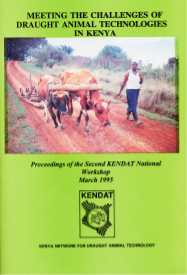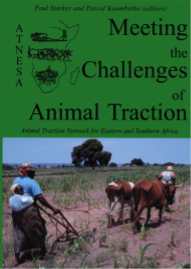| Kenya Network for Draught Animal Technology |
| Kenya Network for Draught Animal Technology |
|
Kenya
Network for Draught Animal Technology |
ATNESA Home Page |
|
KENDAT
aims and objectives ¨
networking
with resourceful individuals and organizations in promotion, to pave way
for deeper understanding and expanded use of DAT and other labour-saving
technologies through training and dissemination, with appropriate
specialist support. ¨
providing
technological input, advice and procurement information and access
capacity for the wide range of animal drawn equipment and accessories for
tillage and transport, while building local capacity and sustainable
equipment production where possible. ¨
creating
advocacy for sustainable DAT and rural transport development by
sensitising policy makers on grassroots concerns in the institutional and
business management of DAT and rural transport services; ¨
strengthening
community participation in decision making and especially working towards
the empowerment of women as resource managers and key actors in the food
production chain. This is a
pre-requisite for accelerated poverty eradication ¨
acting
as the informed voice on DAT issues in Kenya in link with other networks
in the Eastern and Southern African region under the Animal Traction
Network for Eastern and Southern Africa (ATNESA) umbrella; Catholic Relief Services (CRS) and Agricultural Environment Programme (AEP) of South Nyanza. Animal traction training in tillage and transport for programme extension agents. Conservation Tillage Trials in Kenya
KENDAT is implementing a Brooke Hospital for Animals funded project on Donkey Welfare. This is a 3 year project worth about £100,000 to implement practical solutions to donkey welfare and management in rural transport services and tillage in Kenya (2001-2003). This project is in collaboration with DTU of University of Warwick, Coventry (Dr. Colin Oram - Artisan, Design and Training Support) and the Centre for Tropical Veterinary Medicine (CTVM) of the University of Edinburgh, UK (Dr. David Smith, Animal Nutrition and Management Support).
Nkone Bridge Project
This is applied research in technology for intermediate means of transport (IMT): engineering and infrastructure, socio-economics (including gender), logistics, environment, institutional and policy interventions in rural transport with a livelihoods perspective. It is a 3 year project worth £350,000 with varying terms supported by DFID/IUDD - (Infrastructure and Urban Development Department (UK)), Swedish International Development Agency (SIDA) and Natural Resources International Limited (NRIL, UK). Extension, training and development support is provided by Intermediate Technology Development Group (ITDG). Click
here for more information on the KENDAT RTS Project Executive Co-ordinator:
Dr. Pascal G. Kaumbutho, Chartered Engineer, MIAgrE
For more information, contact: Scope of KENDAT activitiesForum for information exchange and planningKENDAT has organised and actively participated in numerous national and international workshops geared towards information exchange and project planning by stakeholders. Numerous participatory and collaborative farm demonstrations, user competitions researches and other activities have been conducted. For KENDAT the participatory approach and methodology has made the whole difference in rural development impact. DatabaseKENDAT has a stock of publications of previous animal traction workshops, ATNESA resource books, pamphlets for harnessing implement adjustments, animal drawn cart manufacturing and other manuals. Practical lecture notes, animal and farmer training packages, texts, pictures, videos and reports on topical issues of animal traction development are available as is information on collaborating national networks in the region and the world expertise and scope in animal traction development. TrainingKENDAT has an extensive training prospectus with courses spread all year, in the wide range of animal traction, farm and other management for user clientele, including farmers, transporters, artisans, paravets etc. The prospectus is available on request. KENDAT Membership and AffiliationThe KENDAT membership is geared towards generation of a national feeling of team work between collaborators. The KENDAT membership consists of researchers, manufacturers,
extensionists, farmers, tranporters other practitioners, NGOs, government agencies and community groups (including women groups). KENDAT CollaboratorsNationally, KENDAT has real working relationships with Ministry of Agriculture, Mechanization Branch, University of Nairobi
(Agricultrual Engineering), ACK Rural Development Programme (Kirinyaga), FARM Africa, Tripple W Engineering of Naro
Moru, SARDEP Programmes of Laikipia & Kajiado, World Vision (Loitokitok and
Narok), Rural Focus of Nanyuki, Budokoni Women Group and One World Development Foundation -
Busia, Animal Draft Programme - Homa Bay; OXFAM UK; Catholic Relief Services and Agriculture and Environment Project
(AEP) of Homa Bay Diocese, KARI; Kisumu Innovation Centre (KICK), Kenya Institute of Organic Farming
(KIOF), Farming Systems Kenya, GTZ Marsabit Development Programme (MDP), Stockwatch and others. Operational Structure and Capacity for Consultancy WorkKENDAT's governing body is an executive board with a consultancy wing Development Technology Ventures Ltd who act as the Advisory Body (AB). The board and the AB are composed of eminent professionals and practitioners with a wealth of experience with DATs. The individuals operate with a much broader resource and knowledge form the network of numerous collaborators. KENDAT has expert input for consultancy work in:
|

Click
here
Click here
to see
|
|
Contact
us!
Kenya Network for Draught Animal
Technology (KENDAT) |
|
|
Meeting the challenges of animal traction
workshop Click here to see publications on animal traction in Kenya Click here to see KENDAT/FarmAfrica extension leaflets concerning working camels |

|
| |
|
Comments,
corrections and feedback relating to this website are welcome |